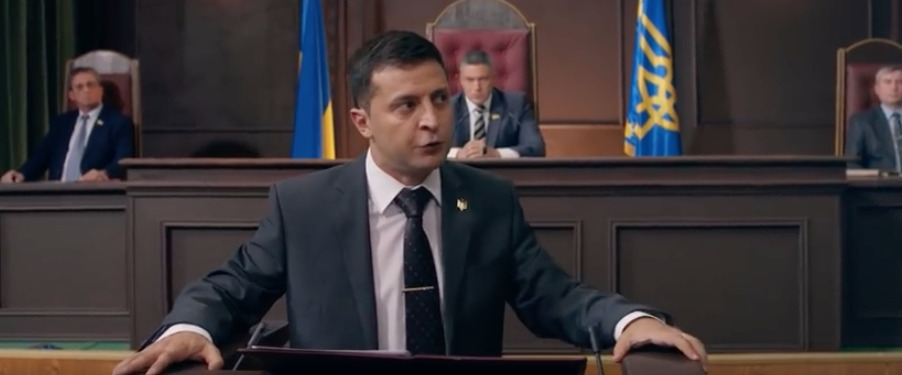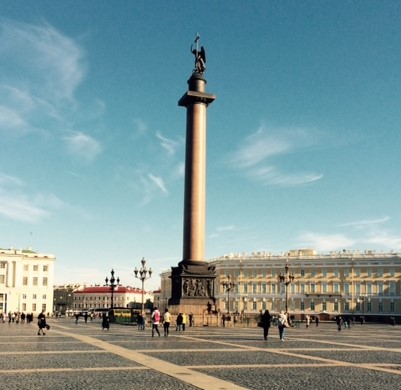
Ukraine’s next president in 2016 trailer for the TV comedy “Servant of the People.” (YouTube)
Volodoymyr Zelensky, who rose to fame for portraying the Ukrainian president in a comedy show has now been elected to the real role, defeating incumbent Petro Poroshenko in the second round of elections with 73% of the vote.
Zelensky tapped into widespread discontent with Poroshenko – another in a long line of corrupt Ukrainian leaders – and ran on a general program of tackling corruption and bringing an end to the conflict in the Donbas. However, he did not elaborate on specific policies to achieve these goals. Due to the significant influence of outside political and economic powers (Washington, the IMF which controls loans the country is currently dependent upon, etc.) and little institutional support, it is difficult to see how Zelensky can steer the country in a meaningfully different direction that will help the majority of Ukrainians who are now the poorest in Europe.
With respect to resolving the conflict in the Donbas, Zelensky will also have to contend with the influence of various armed ultra-nationalist groups.
Though their numbers are relatively small and their agenda has no real traction throughout most of Ukraine, the fact that they are armed, have combat experience in the Donbas, and have demonstrated their willingness to use violence to push their agenda, they constitute a dangerous force. With their deep hatred of Russia and their investment in bringing to power a coup government, fighting on its behalf against fellow Ukrainians in the east, these elements will not accept a compromise with the Donbas rebels.
Thus, it’s hard to see how Zelensky will be able to solve this conundrum even if he has more will to do so than his predecessor, Poroshenko – whom Kevin Zeese reminded readers of Consortium News recently has been on Washington’s payroll for years as exposed by Wikileaks.
A good discussion of Ukraine and the prospects for a Zelensky presidency can be found on a recent episode of Al Jazeera’s Inside Story with Imran Khan:
Representatives of the Russian government have congratulated Zelensky on his victory but seem to be very cautious in regard to expecting any breakthroughs any time soon.
For his part, Putin followed through this past week with the implementation of a plan to allow residents of the Donbas to obtain Russian passports. According to Russia’s Life (Google Translate used):
As Life has learned, the Russian Interior Ministry is ready to begin the procedure for issuing passports to residents of the DPR and LPR. Earlier, a reinforced detachment of employees from the units of the Ministry of Internal Affairs in the field of migration from virtually all regions of Russia was transferred to the Rostov region. They will be on a business trip in shifts. According to Life, for this event even recalled employees from the holidays. According to our data, it may take six months for local residents to issue passports.
The Ministry of Internal Affairs of Russia divided the travel program into three phases. According to the available documents, the completion of the issuance of Russian passports to residents of the two republics is scheduled for September 2019. Life’s sources in the LC and the DPR confirm that preparatory work is already underway.
At the first stage, the passport of the Russian Federation will be received by representatives of state and security agencies, as well as employees of other government departments, who will continue the procedure for issuing passports after the process of registration of all documents is established in the republics….…It is not yet known what types of passports can be issued to residents of the LC and the DPR — domestic or international passports. It is worth noting that the issuance of documents to residents of the LC and the DPR means that Russian citizens will officially live on the territory of the two republics, whose rights will be respected and protected in accordance with the Constitution of the Russian Federation.
Putin’s public comment regarding the policy was:
“We don’t want to create problems to new authorities in Kiev but we can no longer put up with the situation when people living in Donetsk and Lugansk are stripped of any civil rights, this decision has been taken for humanitarian concerns.”
If I’m interpreting this correctly, it sounds like once these passports have been issued to Donbas residents making them effectively Russian citizens, then any military operations against the people of the LPR or DPR that result in deaths will mean that the Kiev government will be responsible for the deaths of Russian citizens. This is a very interesting idea to potentially deter continuing violence against the Donbas.
The OSCE criticized the “unilateral” move by Russia and expressed concern that it would interfere with negotiations toward a peaceful conclusion of the conflict as reflected in the Minsk Agreement. In response, Zelensky has called for more international sanctions against Russia.
In all fairness, Zelensky can’t really do more than squawk and call for the international community to symbolically spank Russia with more sanctions and condemnation. He has to show from the start that he won’t be pushed around by “big brother” Russia.
However, the reality is that, despite the machinations of the west in collusion with a minority of corrupt oligarchs and ideological extremists to install an anti-Russian power structure in Ukraine, it is simply not feasible in the long run for most Ukrainians. Contemporary Russia has its historical roots in Ukraine (Kiev Rus), many Ukrainians speak Russian, millions of Ukrainians are married to Russians or are children of such a mixed marriage, millions of Ukrainians work in Russia and send remittances back, and the two countries have trade ties that are more valuable to Ukraine than Russia. As Professor Nicolai Petro wrote recently for The National Interest, Poroshenko’s resounding defeat – the worst in post-Soviet history – represents a rejection of the extreme anti-Russian agenda put forth by Washington’s darling.
Putin, for his part, set out his intention a long time ago to provide Russian passports for Donbas residents who wanted it. It was his way of letting an intransigent Kiev government know that there would eventually be consequences for refusing to abide by its obligations under the Minsk agreements, which kept the conflict going and the Donbas residents vulnerable. It’s likely that Putin chose the timing of implementation intentionally to send the new government a message also. Whether this was the best way to kick off relations with Ukraine’s new president, I’m not sure.
Perhaps after this initial brouhaha dies down, the Zelensky government will recognize its long-term interest in settling the civil war in the east. But, as stated before, Zelensky will have to find the courage to stand up to the ultra-right and Washington. And Zelensky will have to have the wisdom and credibility to put together a team who can competently carry out the much-needed agenda that Ukraine needs, particularly diplomacy with Russia.
That’s a lot of ifs.
***
Patrick Lawrence has Part I of an in-depth interview of independent on-the-ground journalist Sharmine Narwani regarding her years-long coverage of the Syrian War. Read it at Salon.com.


